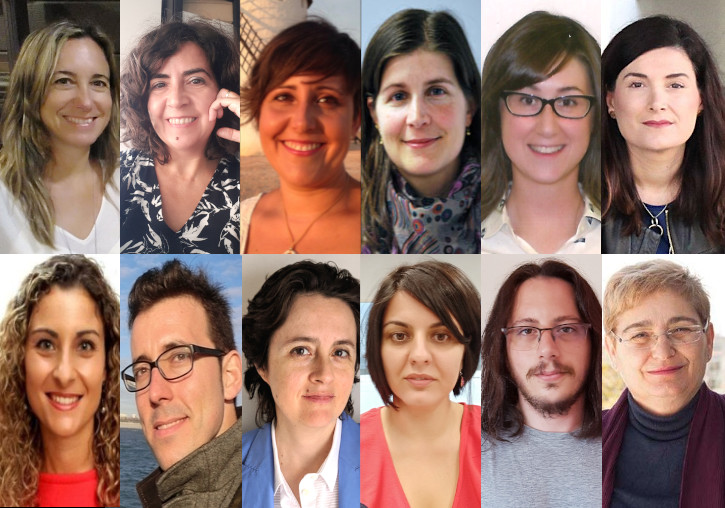How gender roles and social environment influence freedom of choice of professional career investigated
- Scientific Culture and Innovation Unit
- February 10th, 2021

Girls4STEM is a project of the University of Valencia (UV) that promotes careers in Science, Technology, Engineering and Mathematics (STEM) among students from 6 to 18 years old, their families and teachers, and with special emphasis on girls and teenagers. In this framework, the UV research staff involved has analysed the perception on the branches related to ICT. Scientific articles show concern for the false sense of freedom to choose a professional career and highlight the lack of gender balance in technological society. To make this issue clear and raise awareness, the Girls4STEM initiative organises events and conferences with the participation of schools and professional women in the STEM field.
The UV researchers Emilia López-Iñesta, Carmen Botella, Silvia Rueda, Anabel Forte and Paula Marzal have analysed the influx data in the degrees offered by the ETSE-UV related to Information and Communication Technologies (ICT) and they have found that women are not the majority in ICT areas.
Furthermore, the article, published in the IEEE Ibero-American Journal of Learning Technologies, “presents evidence against the common thought that establishes that girls do not access STEM disciplines because ‘they don’t like them’. Should we be concerned? Is there real freedom of choice that is not conditioned by the environment?”, question the authors who continue to explain that “they are not free decisions, since both the expectations of success and the perceived value are conditioned by gender roles and by the influence of the school, family and social environment in which we find ourselves”.
“It is established that girls prefer careers that have a greater social impact linked to interpersonal relationships, but, for example, a field such as robotics is not associated with caring for the elderly, despite having a high social application”, underline the authors. On the other hand, they also add that “the presence of women in STEM and ICT areas acting as references for boys and girls has very positive implications for changing their perception, eliminating the unconscious biases that make them not choose these disciplines and increasing their future job opportunities”.
Educate for inclusion and diversity
The UV research team formed by members of the Girls4STEM project, Xaro Benavent, Esther de Ves, Anabel Forte, Carmen Botella-Mascarell, Emilia López-Iñesta, Silvia Rueda, Sandra Roger, Joaquín Pérez, Cristina Portalés, Esther Durá, Daniel García-Costa and Paula Marzal, has focused on the Sustainable Development Goals (SDGs) that seek to educate children as future citizens in terms of equity, inclusion, diversity, prosperity and justice. Their research has been published in the academic journal Sustainability.
In this case, the project focuses on ODS4 and ODS5 through the organisation of dissemination activities where the student body, their families, their teachers and STEM professional women participate through two actions: the Girls4STEM Family talks and the Girls4STEM Professional talks. The article presents results from the first edition, where it highlights the need to continue disseminating the meaning of STEM and the studies it encompasses.
Talks for families
The Family talks are aimed at a family audience. Enrolled schools have to submit for each team a biography of a different female STEM expert and the students have to produce a video explaining the biography of the assigned female STEM professional. With these videos, talks are organised where the centers, families, teachers and female STEM experts participate, who are in charge of explaining the day-to-day life of their jobs and thus showing their profession. “It is important that families participate in these events because it is the families who will help these girls to decide that STEM careers are a very important option for their future”, explains Xaro Benavent, professor at the UV Department of Computer Science.
The Professional talks are aimed at the general adult public, including teachers of various educational levels. In these conferences, the STEM experts talk about a scientific dissemination topic related to their professional career so that it is better understood in what they do research and in what they work. The next Professional talks will be on March 11 and April 14.
Results by races
Among the results, the article highlights that 22.5% of those who participated consider Economics as a STEM career, which according to the team indicates a lack of knowledge about this concept. Furthermore, girls seem to be more confident in themselves in Languages and Natural Sciences, while boys do in Physical Education, Mathematics and Geography. Only 35% of the girls mentioned Mathematics as one of the subjects that they exercise better, while this percentage increases to 50% in boys. The research mentions the high perception that boys have about their performance in Physical Education and points out that this perception can be explained by social gender roles that impose higher standards for the physical condition of men.
“In order to design the digital society of the future, women have to be present both in the basic technological strata as well as in the managerial technological strata of society. At present, technological society is not balanced in terms of gender, and to achieve this balance, technological and scientific training is essential”, the authors conclude.
More information about Girls4STEM at: http://www.girls4stem.es/#/principal
Talks schedule: https://ir.uv.es/qn8dZS7
Other Girls4STEM events: https://ir.uv.es/6RUJHrI
Article: E. López-Iñesta, C. Botella, S. Rueda, A. Forte and P. Marzal, «Towards Breaking the Gender Gap in Science, Technology, Engineering and Mathematics», in IEEE Revista Iberoamericana de Tecnologias del Aprendizaje, vol. 15, no. 3, pp. 233-241, Aug. 2020, doi: 10.1109/RITA.2020.3008114.
Link: https://go.uv.es/t1JvKli
Article: Benavent, X.; de Ves, E.; Forte, A.; Botella-Mascarell, C.; López-Iñesta, E.; Rueda, S.; Roger, S.; Perez, J.; Portalés, C.; Dura, E.; Garcia-Costa, D.; Marzal, P. «Girls4STEM: Gender Diversity in STEM for a Sustainable Future». Sustainability 2020, 12, 6051.
Link: https://go.uv.es/pnzlRr1
















